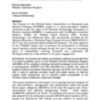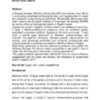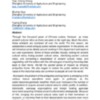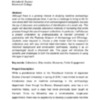2017 Session 4: Ensuring a Sustainable Future for UCH: Museums and Public Engagement
Dublin Core
Title
2017 Session 4: Ensuring a Sustainable Future for UCH: Museums and Public Engagement
Description
Cultural heritage derives its value from societal contexts, and so public engagement plays an important role in growing support for, and interest in heritage. Engagement may take many forms, from awareness-raising to formal learning programmes to creating platforms for public participation in the process of heritage conservation, governance, and/or interpretation. Papers bridging theoretical and practical approaches to engagement with UCH are particularly welcome, as are papers which offer collaborative and/or participatory models, stakeholder engagement, capacity-building and development, approaches to the particular challenges of engagement with underwater cultural heritage vs other kinds of cultural heritage.
Of course heritage exists in a variety of cultural frameworks, and ensuring sustainability requires approaches to engagement to be both responsive and sensitive to the overlapping cultural contexts in which UCH may exist. As a culturally diverse region, the treatment of heritage must be also tailored to cultural definitions, heritage management frameworks and conventions which may, in some cases, differ across jurisdictions/countries and their interests. The panel will also attempt to explore the ways in which UCH is managed within diverse cultural frameworks, and invites papers to examine topics including contested UCH, ownership, security, etc.
The panel invites papers exploring significance within local, national and transnational historiographies and the implications for funding and management of UCH. UCH includes material that has been deposited on the seabed as a result of warfare and catastrophe, so papers which explore and/or engage with topics including loss, warfare, conflicted significance and contested heritage are particularly welcome.
Other relevant sub-themes include:
* Public engagement in the management of UCH
* Interpreting maritime cultural heritage for non-specialist audiences
* Significance, interpretative potential, stakeholders and support/sustainability
* Museums, Education, Outreach and Conservation
* Memory, memorials and memorialisation
Of course heritage exists in a variety of cultural frameworks, and ensuring sustainability requires approaches to engagement to be both responsive and sensitive to the overlapping cultural contexts in which UCH may exist. As a culturally diverse region, the treatment of heritage must be also tailored to cultural definitions, heritage management frameworks and conventions which may, in some cases, differ across jurisdictions/countries and their interests. The panel will also attempt to explore the ways in which UCH is managed within diverse cultural frameworks, and invites papers to examine topics including contested UCH, ownership, security, etc.
The panel invites papers exploring significance within local, national and transnational historiographies and the implications for funding and management of UCH. UCH includes material that has been deposited on the seabed as a result of warfare and catastrophe, so papers which explore and/or engage with topics including loss, warfare, conflicted significance and contested heritage are particularly welcome.
Other relevant sub-themes include:
* Public engagement in the management of UCH
* Interpreting maritime cultural heritage for non-specialist audiences
* Significance, interpretative potential, stakeholders and support/sustainability
* Museums, Education, Outreach and Conservation
* Memory, memorials and memorialisation
Creator
Raphael Igombo
National Museums of Kenya, Kenya
National Museums of Kenya, Kenya
Michelle Damian
Monmouth College (IL), USA
Monmouth College (IL), USA
Collection Items
PRIISMH project: A Case Study of Community Involvement and Museum Collaboration on Maritime Cultural Heritage around Rottnest Island (Perth, Western Australia)
The Program for the Rottnest Island Interpretation of Shipwrecks and Maritime Heritage (PRIISMH) project is a community-based initiative conducted under the aegis of the Maritime Archaeology Association of Western Australia (MAAWA), in collaboration…
Forgotten Past? Alternative Forms for Museological Approach to interpret Egypt's Maritime Heritage
In the past decades, Ministry of Antiquities (MA) has invested many efforts in excavating underwater archeological sites, and mapping them to reveal the navigation routes during ancient times. Remarkable discoveries have been made by the European…
Antiquities Homecoming:An Experience of Rescue Team of Cultural Relics
Through five thousand years of Chinese culture, thereare as many ancient cultural relics as there are stars in the night sky. Much like stars, these artefacts are scattered all over the world. For this reason, we established a small antiquity public…
Merging Museums with the Classroom: Using Collections to Teach Maritime Archaeology
Although there is a growing interest in studying maritime archaeology even at the undergraduate level, it can be a challenge to bring to life for non-divers both the mechanics of an archaeological investigation, but also the joy of discovery and…
Collection Tree
- Proceedings of the 2017 Asia-Pacific Regional Conference on Underwater Cultural Heritage
- 2017 Session 4: Ensuring a Sustainable Future for UCH: Museums and Public Engagement




